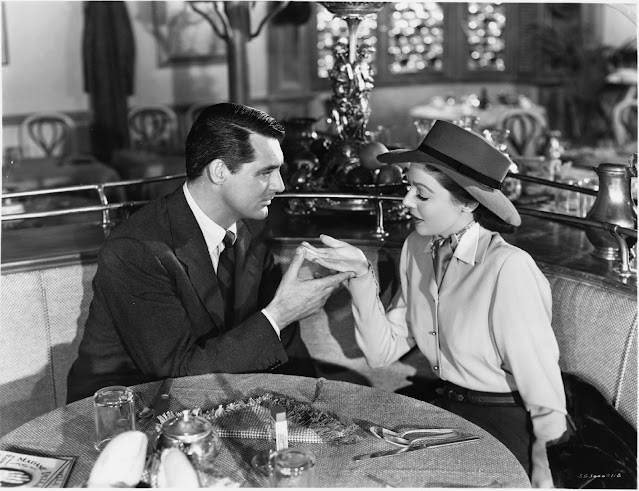The Bishop's Wife ,
Starring Cary Grant, David Niven, Loretta Young, Opens at Astor
By Bosley Crowther
Dec. 10, 1947
 |
| With David Niven. |
Emissaries from heaven are not conspicuously exceptional on the screen, the movies having coyly incarnated any number of these supernatural types, ordained by their fanciful creators to right the wrongs of this world (not to mention the bookkeeping errors that seem to occur up above). And certainly communion with angels is traditional at Christmastime, which is the season when most of us mortals need angelic reassurance anyhow. So there is nothing especially surprising about the miracle that occurs in Samuel Goldwyn's "The Bishop's Wife," which opened last night at the Astor—except that it is superb.And that is very surprising, in view of the realistic fact that it is a sentimental whimsey of the most delicate and dangerous sort. All of us know that angels don't walk the earth like natural men—and definitely not in the image of that debonair rascal, Gary Grant. And most of us have some dark misgivings about the tact of the makers of films when they barge into the private area of a man's communication with his God.But you need have no anxieties in the case of "The Bishop's Wife." It is as cheerful and respectful an invasion of the realm of conscience that we have seen. And it comes very close to being the most enchanting picture of the year — a judgment to which its many merits will shortly make a strong bid. That is because its incursion is on a comparatively simple and humble plane and its whimsey is sensitively syphoned from the more human and humorous frailties of the flesh.We are not going to make an analysis of the many subtle comments in this tale of a full-bodied guardian angel who answers a young bishop's prayer for guidance and spiritual comfort in the midst of a crisis in his life. We are not going to state any morals which this charmingly casual angel proves in drawing the bishop's wrought attention from a new cathedral to the richer services of life—and, particularly, to a fresh fulfillment of his family responsibilities.
We are not going to mouth about these matters, because the picture itself refrains—and that is one of the most endearing of its many endearing young charms.In shaping this warm and winning fable from a Robert Nathan book, Robert Sherwood and Leonardo Bercovici have written with beautiful belief that a point clearly made in performance doesn't have to be hit a dozen times nor a moral quietly manifested put into a hundred solemn words.
And so there is no heavy pounding of the lesson of humanity, of the futility of ostentation, of the special possessiveness of a man's love. Nor is there any such pounding in Henry Koster's directorial style.Smoothly and with artful invention he has induced Mr. Grant to give one of his most fluent and beguiling performances as the angel, "Dudley," who fixes things. And he has got out of David Niven a deliciously dexterous and droll characterization of a sorely pressed young bishop who can't quite cotton to this messenger from on high. Elsa Lanchester, too, is encouraged in an exquisitely faceted role of a twitterly little housemaid who flirts with this angelic gent, and Monty Woolley is actually human as an old dodo who is morally re-inspired. James Gleason, Sara Haden and Gladys Cooper are rich in smaller parts. Weakness is only evident in Loretta Young's unctuousness as the bishop's wife. She is the one artificial, inconsistent and discordant note.Of course, there are probably some people who are going to say that this film encourages a futile illusion with its hope of miraculous aid. But they—if they do—will be missing its most warmly inspiring point which is—but wait a minute That's for you to recognize and enjoy. We cannot recommend you to a more delightful and appropriate Christmas show.
 |
| With Loretta Young and Monty Woolley. |
THE BISHOP'S WIFE;
screen play by Robert E. Sherwood and Leonardo Bercovici;
from the novel by Robert Nathan;
directed by Henry Koster;
produced by Samuel Goldwyn for release through RKO Radio Pictures. Inc.
At the Astor.
Dudley . . . . . Cary Grant
Julia Brougham . . . . . Loretta Young
Henry Brougham . . . . . David Niven
Professor Wutheridge . . . . . Monty Woolley
Sylvester . . . . . James Gleason
Mrs. Hamilton . . . . . Gladys Cooper
Matilda . . . . . Elsa Lanchester
Mildred Cassaway . . . . . Sara Haden
Debby Brougham . . . . . Karolyn Grimes
Maggenti . . . . . Tito Vuolo
Mr. Miller . . . . . Regis Toomey
Mrs. Duffy . . . . . Sara Edwards
Miss Trumbull . . . . . Margaret McWade
Mrs. Ward . . . . . Ann O'Neal





















